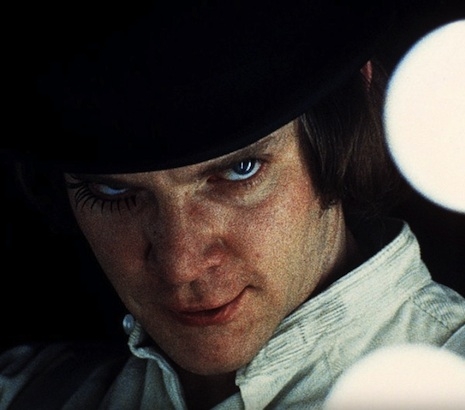
Ken Russell was among the many directors originally touted to direct A Clockwork Orange before Stanley Kubrick. Russell was considered stylistically sympathetic to bring Anthony Burgess’s source novel to cinematic life—he had documented youth gangs as a photographer in the 1950s and made a series of highly influential drama-documentaries and films that had inspired not only Stanley Kubrick but also Lindsay Anderson, Tony Richardson and later Derek Jarman. I wonder what Russell’s version of A Clockwork Orange would have been like? Perhaps more flamboyant, more seedy, more of the end-of the-pier, more human than Kubrick’s aesthetically pleasing but cold and sterile vision. And though the great and the good lobbied to have Mick Jagger play Alex, I wonder if Russell would have opted for his favorite actor Oliver Reed? Oh, what japes they’d have had. Instead Kubrick chose Malcolm McDowell because of his unforgettable and iconic performance as Mick Travis in Lindsay Anderson’s If…
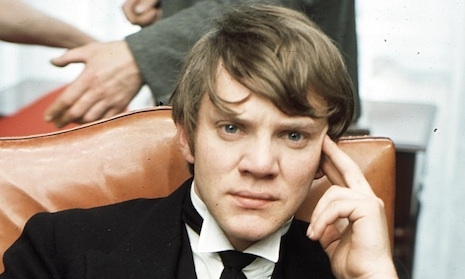
Casting at first sight: director Lindsay Anderson was understandably smitten by McDowell’s beauty, talented and attitude when he cast him as Mick Travis in ‘If…’ The performance that led to his role as Alex in Kubrick’s ‘A Clockwork Orange.’.
McDowell had the blue-eyed, blonde beauty of a fallen angel—he would have been the perfect choice to play Lucifer for Kenneth Anger. McDowell was born in 1943 into a lower middle class family in Leeds, he was never the working class lout as some tabloids like to pretend but a privately educated son to a family who ran a small guest house. He was clever, smart, idealistic, and decided he wanted to be an actor. After school, he found found work as a stage manager on the Isle of Wight before joining the Royal Shakespeare Company. McDowell embraced the cultural rebellion of the 1960s and hated the dominance of the established theatrical institutions, as he once explained to writer Michael Bracewell:
‘The RSC? Horrendous. Middle-class theatre crap…actorly acting with lots of shouting—after [Laurence] Olivier—and soul-searching performances…I mean I saw some great performances—Ian Richardson and Paul Scofield—but it was like being ordered around and told what to do by a bunch of little shitheads. I auditioned for the RSC by reading the Prologue from Henry VIII, for the very good reason that nobody knew it. It begins, “I come no more to make you laugh”, which was ironic, because humour has always been a great mainstay of my arsenal. I mean, A Clockwork Orange was essentially a comic performance. I used to loot my style from Eric Morecambe.’
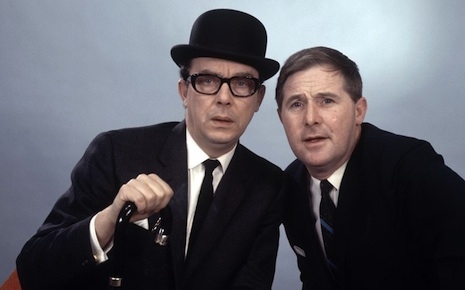
Eric Morecambe (with umbrella and bowler) and Ernie Wise.
Eric Morecambe was the comic half to the much-beloved double-act Morecambe and Wise, who dominated British television screens in the 1960s and 1970s, which brings a different interpretation to his performance as Alex—one that would have been ideal for Ken Russell.
‘I’ve always had to live down A Clockwork Orange wherever I go, because ever since then, with the exception of O, Lucky Man!, which I made with Lindsay [Anderson] immediately afterwards, I’ve always been cast as the heavy. It used to irritate the shit out of me, and then I just got bored with it, you know? I just wanted to get on, maybe make a few comedies or do something else, but there was Alex…I know that I’ve said some mean things about Kubrick in the past, but thinking back to the actual shooting of that film and trying to forget all the baggage of what happened afterwards, it was an incredibly stimulating experience, even though I got to the point where I hated the film because of the reaction.’
This runs contra to McDowell’s enthusiasm as expounded in this interview about A Clockwork Orange he gave with author Anthony Burgess in 1972, but this was still early days and McDowell had not been hamstrung by his move to Hollywood, where he ended-up making movies for the lowest common denominator. McDowell is an exceptionally talented actor and no matter how dire the film he always gives a powerfully memorable performance.
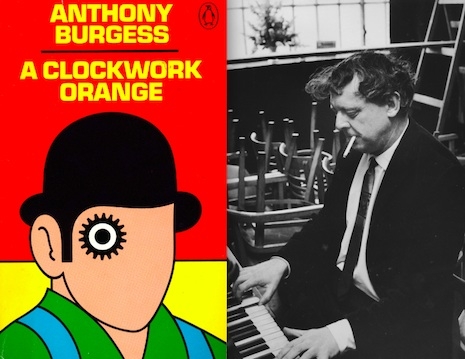
The book and its Beethoven-loving author, Anthony Burgess.
Anthony Burgess came to hate Kubrick’s film too, which was ironic as the movie made Burgess a bigger star than his writing up to that point had achieved. Burgess is a writer’s writer, a polymath who claimed he would rather be known for his musical compositions than his books. Burgess wrote A Clockwork Orange in 1962, after being mistakenly told he had not long to live. To ensure he left money for his wife, Burgess wrote a series of novels in quick succession, one of which was A Clockwork Orange. It was moderately successful on publication, a cult book, that became a bestseller after Kubrick’s movie. Burgess claimed he took the title from an old East London saying, “As queer as a clockwork orange,” which may or may not be true, as there appears to be no known record of this phrase. Whatever its derivation, it perfectly captured the book’s theme of a hideous artificial will imposed on natural behavior.
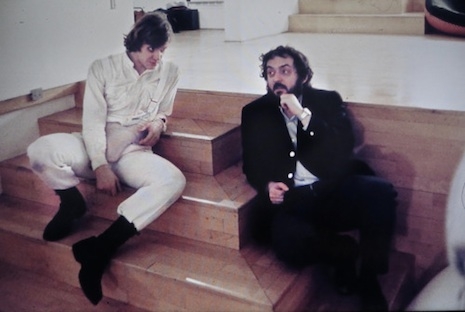
McDowell and Kubrick on set during filming.
After Kubrick’s film version of A Clockwork Orange was released in Britain in 1971, it was ironically linked to a series of violent crimes. The first was the murder of a tramp by a 16-year-old youth; the second involved another 16-year-old who, while dressed in the film’s distinctive gang uniform, stabbed a younger boy; the third was the brutal and horrific gang rape of a Dutch girl by a group of youths from Lancashire, as they sang “Singing in the Rain”.
Sentencing the 16-year-old for assaulting a child, a judge described the attack part of a “horrible trend” prompted by “this wretched film”. Following death threats and warnings from the police over revenge attacks, Kubrick asked Warner Brothers to pull the film from its UK release. For a very long time, through the 1980s and 1990s, the nearest place Brits could see A Clockwork Orange was Paris. It was only after Kubrick’s death in 1999 was his ban lifted and the film re-released in the UK.
Previously on Dangerous Minds
Anthony Burgess and the Top Secret Code contained in ‘A Clockwork Orange’